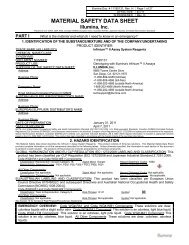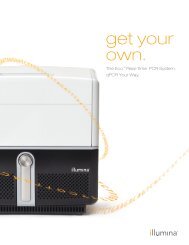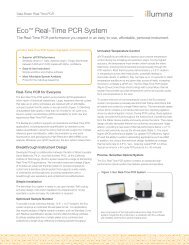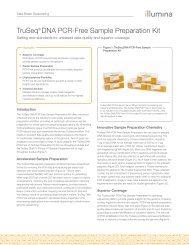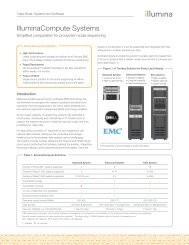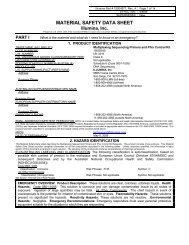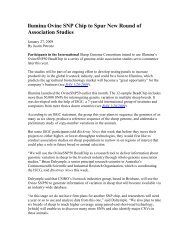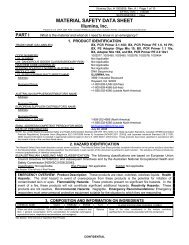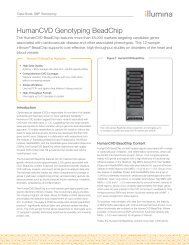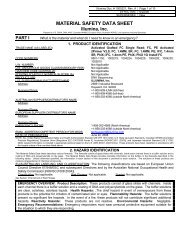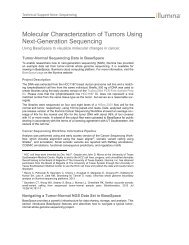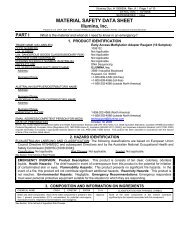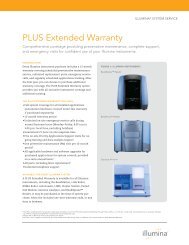CanineSNP20 BeadChip - Illumina
CanineSNP20 BeadChip - Illumina
CanineSNP20 BeadChip - Illumina
You also want an ePaper? Increase the reach of your titles
YUMPU automatically turns print PDFs into web optimized ePapers that Google loves.
ILLUMINA ® SNP GENOTYPING<br />
<strong>CanineSNP20</strong> <strong>BeadChip</strong><br />
Developed in collaboration with the Broad Institute, the <strong>CanineSNP20</strong> Panel features more<br />
than 22,000 evenly spaced and validated SNPs derived from the CanFam2.0 assembly. This<br />
12-sample Infinium ® <strong>BeadChip</strong> presents a cost-effective and high-quality genotyping solution<br />
for researchers conducting whole-genome association studies within domestic dog breeds.<br />
INTRODUCTION<br />
The unique breeding history of the<br />
domestic dog offers the research<br />
community a powerful opportunity<br />
for unraveling the genetic basis of<br />
disease, behavioral and morphological<br />
traits, and mammalian variation.<br />
The high frequency of certain<br />
phenotypes within breeds suggests<br />
that only a limited number of loci<br />
are responsible for each trait, making<br />
it potentially easier to identify the<br />
genetic basis of variation in dogs<br />
than in humans 1 .<br />
In 2005, researchers at the Broad<br />
Institute completed the assembly of<br />
the canine genome, CanFam2.0 2 , and<br />
presented the scientific community<br />
with the first comprehensive and<br />
Caninesnp20 BEADCHIP<br />
Highlights<br />
• Unrivaled Call Rates and<br />
Accuracy: > 99% average call<br />
rates and 99.99% reproducibility<br />
• Comprehensive and Uniform<br />
Coverage: Genome-wide coverage<br />
using over 22,300 evenly<br />
spaced SNPs derived from the<br />
CanFam2.0 reference sequence<br />
• Simple Workflow: PCR-free protocol<br />
with the powerful Infinium<br />
Assay<br />
High-Throughput Format:<br />
• Up to<br />
12 samples can be interrogated<br />
in parallel<br />
high-quality reference sequence for<br />
the domestic dog. Out of the individual<br />
dogs submitted as candidates,<br />
the Broad researchers selected a female<br />
boxer to serve as the reference<br />
sequence because this inbred dog<br />
displayed the least variation in its<br />
genome 3 . The Broad team sequenced<br />
more than 99% of the boxer’s euchromatic<br />
genome and compiled a list of<br />
more than 2.5 million SNPs by comparing<br />
the boxer reference sequence<br />
to ten other breeds 3 .<br />
<strong>Illumina</strong> has developed the<br />
<strong>CanineSNP20</strong> Genotyping <strong>BeadChip</strong><br />
in collaboration with the Broad<br />
researchers who assembled the<br />
CanFam2.0 genome. This array contains<br />
more than 22,000 validated<br />
SNP probes derived from the<br />
CanFam2.0 assembly. Featuring<br />
highly polymorphic SNP content<br />
and providing uniform coverage, the<br />
<strong>CanineSNP20</strong> <strong>BeadChip</strong> enables the<br />
interrogation of genetic variation in<br />
any domestic dog breed. Importantly,<br />
this <strong>BeadChip</strong> presents an average of<br />
eight SNPs per megabase (Mb), providing<br />
ample SNP density for robust<br />
within-breed association studies.<br />
The <strong>CanineSNP20</strong> <strong>BeadChip</strong> is<br />
<strong>Illumina</strong>’s first non-human standard<br />
genotyping panel powered by the<br />
Infinium Assay. This revolutionary<br />
assay provides the industry’s<br />
highest call rates, allows for flexible<br />
content deployment, and enables the<br />
detection and measurement of copy<br />
FIGURE 1: CanineSnp20 Beadchip<br />
The <strong>CanineSNP20</strong> Genotyping <strong>BeadChip</strong><br />
features more than 22,000 evenlyspaced<br />
SNPs across the entire dog<br />
genome.<br />
number variation. In addition, the<br />
assay’s single-tube sample preparation<br />
without PCR or ligation steps 4,5<br />
significantly reduces labor and<br />
potential sample handling errors.<br />
The multi-sample <strong>CanineSNP20</strong><br />
<strong>BeadChip</strong> further reduces experimental<br />
variability by allowing<br />
researchers to interrogate up to 12<br />
samples in parallel.<br />
The combination of <strong>Illumina</strong>’s<br />
proprietary assay technologies,<br />
unconstrained locus selection, and<br />
high-throughput format presents<br />
the most comprehensive solution<br />
for whole-genome studies in the<br />
domestic dog.
ILLUMINA ® SNP GENOTYPING<br />
SNP selection strategy<br />
The SNP content featured on the<br />
<strong>CanineSNP20</strong> <strong>BeadChip</strong> was selected<br />
from a diverse population of dog<br />
breeds. Single-direction reads from<br />
these breeds were aligned to the<br />
boxer reference sequence to identify<br />
polymorphic loci. Breed-specific<br />
SNPs were preferentially selected<br />
over the reference genome SNPs to<br />
provide researchers with a set of<br />
informative loci that are likely to<br />
segregate differently among breeds.<br />
Loci from the reference sequence<br />
were secondarily chosen when other<br />
breed SNPs were not available to<br />
maintain an average SNP density of<br />
eight SNPs per Mb. By employing this<br />
content selection strategy, <strong>Illumina</strong><br />
has constructed a whole-genome<br />
genotyping microarray that empowers<br />
confident disease mapping in<br />
all dog breeds (Table 2). Additional<br />
<strong>CanineSNP20</strong> <strong>BeadChip</strong> content<br />
includes 37 SNPs in 12 well-characterized<br />
cytokine genes for investigators<br />
interested in immunological studies.<br />
sequence with 6% of the genomes haplotype diversity within breeds<br />
from ten additional breeds. They demonstrated<br />
that linkage disequilibrium of SNPs is required to map genes of<br />
suggest that a much lower density<br />
(LD) within breeds stretches over distances<br />
of several megabases, while LD more, it indicates that additional SNP<br />
interest in the domestic dog. Further-<br />
across breeds, on average, is limited to density offers diminishing returns.<br />
tens of kilobases 2 . They also discovered<br />
that discrete haplotype blocks could be sufficient for dog associa-<br />
As few as 10,000 evenly spaced SNPs<br />
within breeds contain approximately tion studies, depending on the breed<br />
three to five haplotypes at each locus 3 . and trait of interest 3 .<br />
The long-range LD and reduced<br />
With more than 22,000 uniformly<br />
FIGURE 2: <strong>CanineSNP20</strong> <strong>BeadChip</strong> probe spacing<br />
<strong>CanineSNP20</strong> Frequency of Gaps (Chromosome 1-38, X)<br />
0.12<br />
Frequency of Gaps (%)<br />
0.10<br />
0.08<br />
0.06<br />
0.04<br />
0.02<br />
0<br />
0-9 10- 20- 30- 40- 50- 60- 70- 80- 90- 100- 110- 120- 130- 140- 150- 160- 170- 180- 190- 200- 250- >300<br />
19 29 39 49 59 69 79 89 99 109 119 129 139 149 159 169 179 189 199 249 299<br />
Gap Size (Kb)<br />
The <strong>CanineSNP20</strong> <strong>BeadChip</strong> provides uniform coverage across the entire genome.<br />
Complete Coverage with<br />
~22,000 SNPs<br />
The haplotype structure of the modern<br />
domestic dog clearly reflects the<br />
two population bottleneck events<br />
that occurred during its evolution.<br />
The first bottleneck can be traced to<br />
the domestication of the wolf, approximately<br />
7,000–9,000 generations<br />
ago. The recent bottleneck began<br />
less than 100 generations ago and is<br />
the result of intensive inbreeding to<br />
create modern domestic dog breeds.<br />
Consequently, short-range LD exists<br />
across dog breeds while long-range<br />
LD is present within breeds.<br />
As a part of their comprehensive<br />
analysis of the dog genome, Broad<br />
researchers compared the entire<br />
genome of the canine reference<br />
FIGURE 3: Physical map of <strong>CanineSNP20</strong> Beadchip probes<br />
CanFam2.0 Chromosome Position (bp)<br />
120<br />
100<br />
80<br />
60<br />
40<br />
20<br />
SNP Spacing by Chromosome<br />
0<br />
0 5 10 15 20 25 30 35<br />
Chromosome<br />
The <strong>CanineSNP20</strong> <strong>BeadChip</strong> offers comprehensive coverage that correlates well with<br />
the available SNPs per chromosome identified in the CanFam2.0 assembly.<br />
X
ILLUMINA ® SNP GENOTYPING<br />
distributed SNPs, the <strong>CanineSNP20</strong><br />
<strong>BeadChip</strong> offers more than sufficient<br />
coverage for confident identification<br />
and mapping of qualitative loci of<br />
interest. The average SNP density<br />
of eight per Mb enables researchers<br />
to differentiate up to five haplotypes<br />
per Mb within breeds.<br />
HIGH-QUALITY data<br />
The 22,362 SNP assays on the<br />
<strong>CanineSNP20</strong> <strong>BeadChip</strong> were subjected<br />
to rigorous functional testing<br />
to ensure strong performance using<br />
<strong>Illumina</strong>’s Infinium Assay. Wholegenome<br />
association studies are successful,<br />
in part, due to high call rates<br />
and accurately called genotypes. Since<br />
complex disease traits often have<br />
relatively small gene effects, potential<br />
associations may be missed if the<br />
assayed SNP in linkage disequilibrium<br />
with the disease SNP has a low call<br />
rate or incorrect genotype call.<br />
<strong>Illumina</strong> ensures that every Canine-<br />
SNP20 <strong>BeadChip</strong> offers > 99% call rate.<br />
Table 1 shows the outstanding<br />
results from <strong>Illumina</strong>’s internal validation<br />
of the <strong>CanineSNP20</strong> <strong>BeadChip</strong>.<br />
During this product’s development,<br />
396 loci were identified and retained<br />
that appear to have an adjacent or<br />
third polymorphism (e.g., deletion or<br />
third allele) among the breeds sampled.<br />
Although these loci yield lower<br />
call rates when compared to the other<br />
loci on the panel, they were retained<br />
because they may provide biologically<br />
relevant information for traits of<br />
interest and for future improvements<br />
in the genome build.<br />
More than 21,000 SNP loci (94%) on<br />
the <strong>CanineSNP20</strong> <strong>BeadChip</strong> are polymorphic<br />
across the samples that were<br />
interrogated for product quality testing<br />
(Table 2). The average minor allele<br />
frequency (MAF) across all the breeds<br />
and reference family is 0.27, while the<br />
Table 1: Caninesnp20 BEADCHIP performance data and Specifications<br />
Parameter Percent Product Specification<br />
Average Call Rate 99.81% > 99%<br />
Reproducibility > 99.9% > 99.9%<br />
Mendelian Inconsistencies 0.09% < 0.1%<br />
Results based on 316 DNA samples including four replicates and 39 trios from nine<br />
breeds, and an F2 intercross between a Border Collie and Newfoundland 6 .<br />
Table 2: diversity of breeds used to evaluate <strong>CanineSNP20</strong> <strong>BeadChip</strong><br />
Breed<br />
# of DNA<br />
samples<br />
breed-specific MAFs range from 0.18<br />
to 0.25 (Table 2).<br />
Sixty-five markers were identified<br />
as fixed for opposite alleles in<br />
breed-breed comparisons among the<br />
ten sample groups surveyed (Table 3),<br />
indicating that this panel is suitable<br />
for researchers interested in genotyping<br />
for breed confirmation among the<br />
breeds represented. These breeds<br />
were selected to represent diverse ancestries<br />
and encompass ancient gene<br />
lineages. Thus, the data from the nine<br />
evaluated breeds strongly predict that<br />
the <strong>CanineSNP20</strong> <strong>BeadChip</strong> performance<br />
can be generally extrapolated<br />
to most, if not all, domestic dog breed<br />
populations.<br />
call<br />
rate*<br />
Polymorphic<br />
Loci (MAF > 0.05)<br />
average<br />
MAF<br />
Beagle 32 99.80 16,190 0.20<br />
Brittany 33 99.81 17,866 0.21<br />
Dachshund 32 99.82 18,146 0.23<br />
German Shepherd 32 99.78 15,337 0.18<br />
Greyhound 32 99.82 16,791 0.20<br />
Jack Russell Terrier 32 99.81 19,975 0.25<br />
Labrador Retriever 32 99.84 18,489 0.22<br />
Shar Pei 32 99.82 17,739 0.21<br />
Standard Poodle 32 99.75 18,368 0.22<br />
F2 Intercross 6 27 99.82 15,375 0.20<br />
Total 316 99.81 21,074 0.27<br />
*Call rates across sample set include 396 loci that appear to have deletion or third<br />
polymorphism.<br />
illumina SOLUTIONS FOR GENOTYPING<br />
The high-quality data and low persample<br />
cost of the <strong>CanineSNP20</strong><br />
<strong>BeadChip</strong> are part of the powerful<br />
<strong>Illumina</strong> Whole-Genome Genotyping<br />
Solution. In addition, optional<br />
automation and the Laboratory Information<br />
Management System (LIMS)<br />
lower costs by eliminating errors<br />
associated with manual processing.<br />
<strong>Illumina</strong> genotyping products can<br />
be accessed via <strong>Illumina</strong> Fast Track<br />
Genotyping Services, the <strong>Illumina</strong><br />
Customer Sample Evaluation (CSE)<br />
Program, or one’s own <strong>Illumina</strong><br />
BeadStation. <strong>Illumina</strong> solutions<br />
provide industry-leading levels of<br />
accuracy, flexibility, and affordability.
ILLUMINA ® SNP GENOTYPING<br />
Table 3: <strong>CanineSNP20</strong> BeadCHip Breed Informative Markers<br />
German<br />
Shepherd<br />
Beagle Brittany dachshund<br />
Greyhound<br />
Jack<br />
Russell<br />
Labrador<br />
retriever<br />
Shar<br />
Pei<br />
Standard<br />
Poodle<br />
F2 intercross<br />
Beagle X 0 0 1 2 0 0 0 1 7<br />
Brittany 0 X 0 2 0 0 0 0 0 1<br />
Dachshund 0 0 X 1 5 0 0 0 0 3<br />
German<br />
Shepherd<br />
1 2 1 X 6 1 1 3 1 15<br />
Greyhound 2 0 5 6 X 0 2 1 3 13<br />
Jack Russell<br />
Terrier<br />
Labrador<br />
Retriever<br />
0 0 0 1 0 X 1 0 0 0<br />
0 0 0 1 2 1 X 1 0 2<br />
Shar Pei 0 0 0 3 1 0 1 X 1 4<br />
Standard<br />
Poodle<br />
1 0 0 1 3 0 0 1 X 3<br />
F2 Intercross 7 1 3 15 13 0 2 4 3 X<br />
Loci fixed for opposite alleles can be used as breed informative markers for 17 of the 36 possible pairwise breed comparisons examined in<br />
the development of this panel.<br />
ordering information<br />
catalog No. Product DESCRIPTION<br />
WG-31-123<br />
WG-31-124<br />
WG-31-125<br />
FT-20-110<br />
<strong>CanineSNP20</strong> Whole-Genome<br />
Genotyping Kit (for 48 Samples)<br />
<strong>CanineSNP20</strong> Whole-Genome<br />
Genotyping Kit (for 288 Samples)<br />
<strong>CanineSNP20</strong> Whole-Genome<br />
Genotyping Kit (for 1152 Samples)<br />
<strong>CanineSNP20</strong> FastTrack Service<br />
Project<br />
Each package contains four <strong>BeadChip</strong>s and reagents for processing<br />
48 samples.<br />
Each package contains 24 <strong>BeadChip</strong>s and reagents for processing<br />
288 samples.<br />
Each package contains 96 <strong>BeadChip</strong>s and reagents for processing<br />
1152 samples.<br />
<strong>Illumina</strong>’s FastTrack Services requires a minimum of 94 samples and<br />
1.5 µg of DNA for each sample.<br />
The <strong>CanineSNP20</strong> Genotyping <strong>BeadChip</strong> can process twelve samples in parallel and genotype > 22,362 loci per sample.<br />
REFERENCES<br />
(1) Chase K, Carrier DR, Adler FR, Jarvik T, Ostrander<br />
EA, et al. (2002) Genetic basis for systems of<br />
skeletal quantitative traits: principal component<br />
analysis of the canid skeleton. Proc Natl Acad Sci<br />
USA 99: 9930-9935.<br />
(2) http://www.ncbi.nlm.nih.gov/genome/guide/dog/<br />
(3) Lindblad-Toh K, Wade CM, Mikkelsen TS, Karlsson<br />
EK, Jaffe DB, et al. (2005) Genome Sequence, comparative<br />
analysis and haplotype structure of the<br />
domestic dog. Nature 438(8): 803-819.<br />
(4) Gunderson KL, Steemers FJ, Lee G, Mendoza LG,<br />
Chee MS (2005) A genome-wide scalable SNP genotyping<br />
assay using microarray technology. Nat<br />
Genet 37(5): 549-554. <br />
(5) Steemers FJ, Weihua Chang W, Lee G, Barker DL,<br />
Shen R, et al. (2006) Whole-genome genotyping with<br />
the single-base extension assay. Nat Methods 3(1):<br />
31-33.<br />
(6) Neff MW, Broman KW, Mellersh CS, Ray K, Acland<br />
GM, et al. (1999) A second-generation genetic linkage<br />
map of the domestic dog, Canis familiaris. Genetics<br />
151 (2): 803–820<br />
ADDITIONAL INFORMATION<br />
To learn more about <strong>Illumina</strong>’s<br />
whole-genome genotyping solutions,<br />
please visit www.illumina.com.<br />
<strong>Illumina</strong>, Inc.<br />
Customer Solutions<br />
9885 Towne Centre Drive<br />
San Diego, CA 92121-1975<br />
1.800.809.4566 (toll free)<br />
1.858.202.4566 (outside the U.S.)<br />
techsupport@illumina.com<br />
www.illumina.com<br />
For research use only<br />
© 2007 <strong>Illumina</strong>, Inc. All rights reserved.<br />
<strong>Illumina</strong>, Solexa, Making Sense Out of Life, Oligator, Sentrix, GoldenGate, DASL, BeadArray, Array of Arrays, Infinium, BeadXpress, VeraCode, IntelliHyb, iSelect,<br />
and CSPro are registered trademarks or trademarks of <strong>Illumina</strong>. All other brands and names contained herein are the property of their respective owners.<br />
Pub. No. 370-2007-022. Current as of November 29, 2007.



